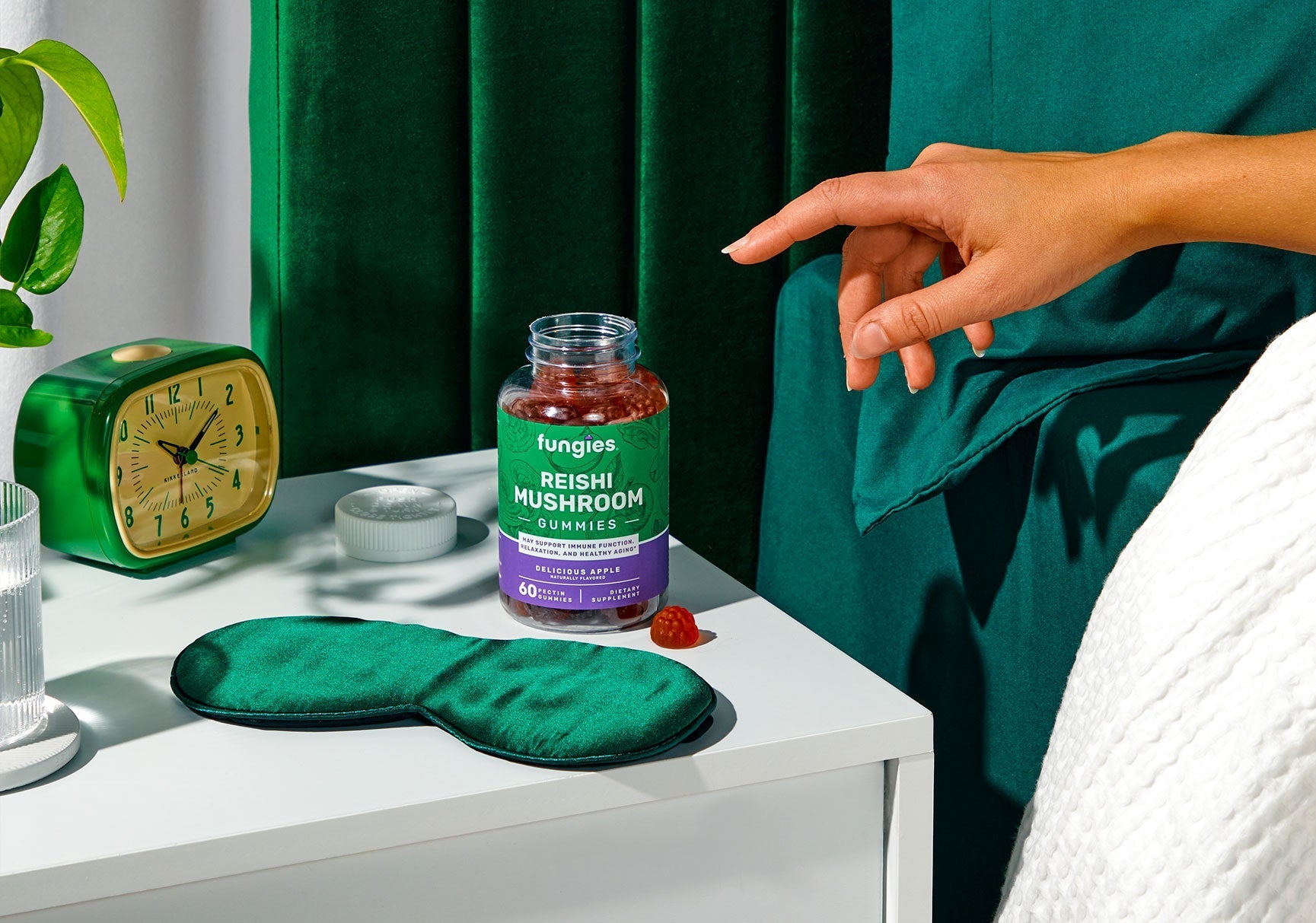Sleep is the most foundational aspect of our health. We cannot survive without adequate sleep, yet the CDC reports that 70 million Americans struggle with chronic sleep problems.[1] Not getting enough sleep can lead to multiple health problems.
Many factors can influence a good night's sleep. Physical and emotional stress can contribute to a person's ability to fall and stay asleep. Reishi mushrooms might be an edible solution for better sleep.
Reishi, Ganoderma lucidum, is an adaptogenic mushroom used for thousands of years in Eastern medicine to manage stress and improve mood.[2]
Reishi helps you sleep in three main ways:
- Increases sleep time and REM sleep
- Improves ability to fall asleep
- Manages stress and helps feelings of fatigue
Let’s uncover more about the power of Reishi mushrooms for a better night’s sleep tonight.
Does Reishi Help You Sleep?
Sleep is a simple act that is foundational to health. Getting a better night’s sleep isn’t as simple as going to bed on time. Managing physical and emotional stress is hugely beneficial to improving sleep.
Let's explore how Reishi can increase sleep time, improve sleep quality, and reduce feelings of stress.
Increase Sleep Time
Mouse studies have demonstrated what Eastern medicine has been putting into practice for thousands of years. Supplementing with Reishi can be an effective tool to get more sleep.
Mice given Reishi for as little as three days significantly increased their total sleep time and non-REM sleep.[3] Another mouse study showed similar results: mice given Reishi slept longer, increased non-REM sleep, and fell asleep faster.[3]
Adults with chronic fatigue reported significantly lower feelings of fatigue after eight weeks of taking a Reishi supplement.[6]
Fall Asleep Faster
Having a busy mind and stressful thoughts can make falling asleep challenging. Reishi’s adaptogenic properties influence the central nervous system, increasing feelings of relaxation and calmness.[2] When the mind is calm, the body creates the right conditions for sleep.
Mouse studies lend an insight into the connection between Reishi and sleep. Mice given a Reishi supplement fell asleep faster and stayed asleep longer.[4]
A chemical analysis of Reishi showed that it helps you fall asleep in less time by influencing the metabolic pathways involved in relaxation before sleep.[5]
Manage Stress
The adrenal glands sit on top of the kidneys and produce hormones in response to stress. Cortisol is a hormone produced during periods of high stress that increases heart rate, blood pressure, and feelings of alertness.
Feeling awake and alert is valuable if you are trying to exercise, but it hinders sleep. Reducing feelings of stress can usher in a good night's sleep.
Adaptogenic mushrooms like Reishi support the stress response by influencing cortisol produced by the adrenal glands. People taking Reishi reported feeling less fatigued.[7]
Reishi Mushroom Gummies
Looking for how to add Reishi to your nightly routine? Fruit-flavored gummies are a tasty and convenient way to get a full serving of Reishi for better sleep tonight.
Each delicious apple-flavored vegan gummy contains the equivalent of 500 milligrams of Reishi mushroom per serving. Free from gluten and GMOs, these gummies are naturally sweetened with real fruit.
Start getting a better night’s sleep tonight with Reishi mushroom gummies.
References
- Center for Disease Control. Adults. Sleep and Sleep Disorders. Reviewed November 2, 2022.
- Wachtel-Galor S, Yuen J, Buswell JA, et al. Ganoderma lucidum (Lingzhi or Reishi): A Medicinal Mushroom. In: Benzie IFF, Wachtel-Galor S, editors. Herbal Medicine: Biomolecular and Clinical Aspects. 2nd edition. Boca Raton (FL): CRC Press/Taylor & Francis; 2011. Chapter 9.
- Cui X, Cui S, Zhang J, Wang Z, Yu B, Sheng Z, Zhang X, Zhang Y. Journal of Ethnopharmacology. 2012;139(3):796-800. doi:10.1016/j.jep.2011.12.020.
- Yao C, Wang Z, Jiang H, Yan R, Huang Q, Wang Y, Xie H, Zou Y, Yu Y, Lv L. Scientific Reports. 2021; 11:13660. doi:/10.1038/s41598-021-92913-6.
- Qiu Y, Mao Z, Ruan Y. BMC Microbiology. 2021; 21:296. doi:10.1186/s12866-021-02361-5.
- Tang W, Gao Y, Chen G, Gao H, Dai X, Ye J, Chan E, Huang M, Zhou S. Journal of Medicinal Food. 2005;8(1). doi:10.1089/jmf.2005.8.53.
- Arroyo I, Rosario-Acevedo R, Aguilar-Perez A, Clemente P, Cubano L, Serrano J, Schneider R, Martínez-Montemayor M. PLOS One. 2013;8(2):e57431. doi:10.1371/journal.pone.0057431.

